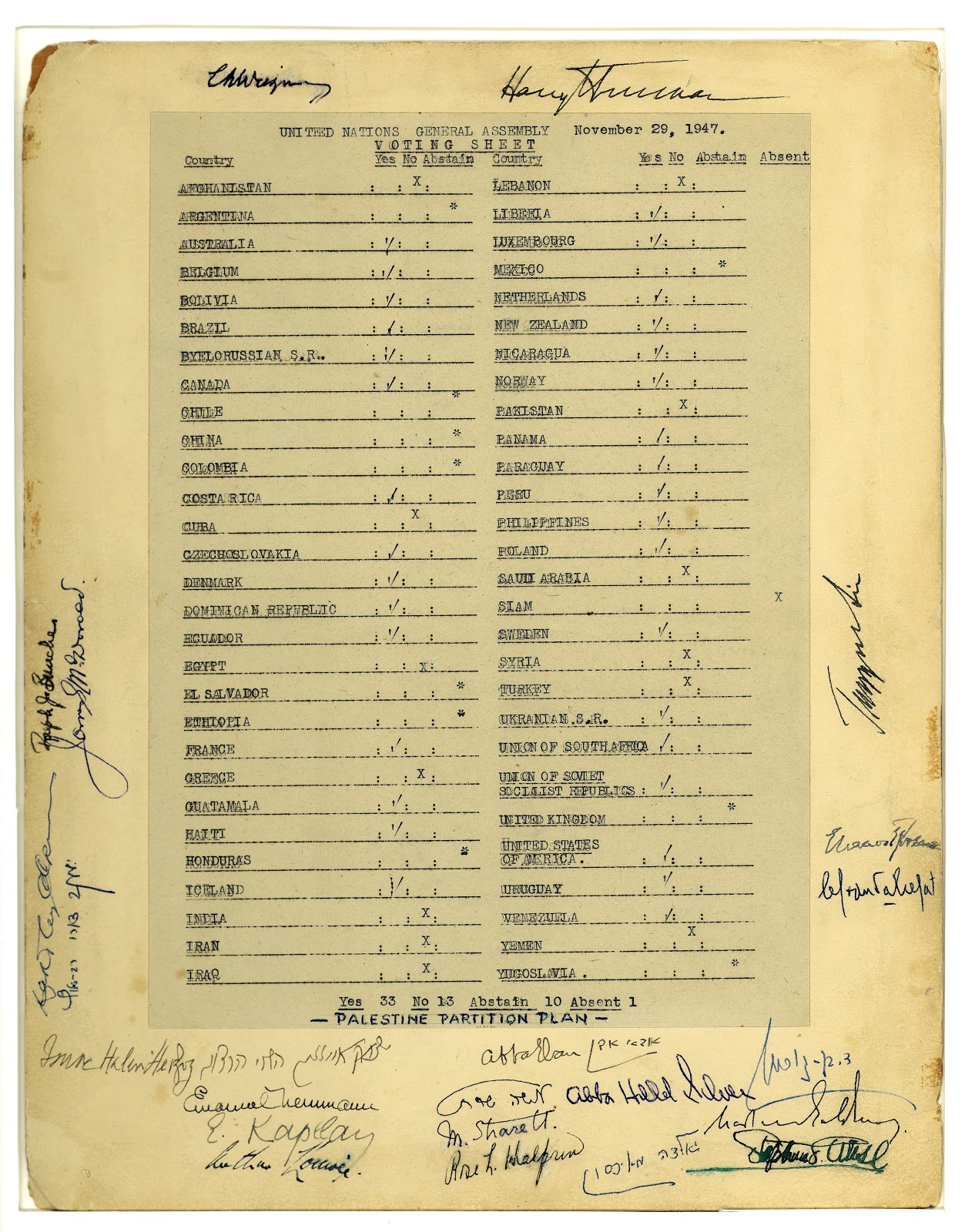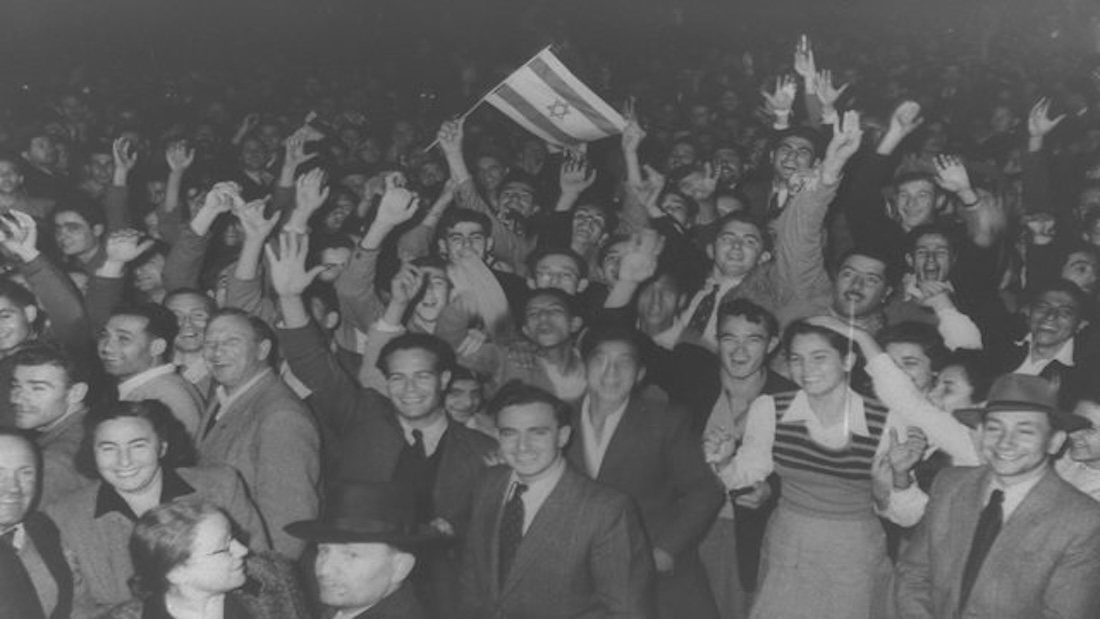Seventy-seven years ago, on the 16th of Kislev in the Hebrew calendar (annually November 29 on the secular). By a vote of 33 to 13, with 10 abstentions, the United Nations passed Resolution 181, approving the partitioning of British-ruled Palestine into Jewish and Arab states (back then, Jews living in the Holy Land were called Palestinians).
It was the Zionist dream. After 1,900 years of prayer, the Jewish nation, the indigenous people of the Holy Land, could again have a sovereign state in its eternal homeland.
Despite what you might have heard, there was never an Arab state called Palestine. The Arabic tradition grew with the establishment of Islam in the early 7th century, approximately 500 years after the Jewish State of Judea was destroyed.
After crushing the Bar Kochba revolt in 135 CE, the Romans punished the Judeans (Jews) for revolting for the second time in sixty years. The Romans changed the country’s name from Judea to Syria Palaestina as a way of poking those rebellious Judeans in the eye. The Romans chose Palaestina because the ancient enemy of the Judeans was the Philistines. The Philistines were long gone by that time, having disappeared from existence around eight hundred years earlier, but the Romans wanted it to hurt badly.
At the same time, the Romans changed the name of Judea’s capital from Jerusalem to Aelia Capitolina (literally Capitoline Hill of the House of Aelius).
After the Roman Empire fell apart, the Byzantine Empire took control of the Holy Land around 330 C.E. It was conquered by Muslim Arab forces and the Ottoman Empire about three hundred years later. Throughout that time, Jews lived in the Holy Land.
After WWI, Great Britain was given Palestine to control. They still called the land Palestine, which the Romans named the land. It was populated by both Jews and Arabs. But three decades after Great Britain was given the land to rule, the hopes and prayers of so many generations of Jews, the endemic people of the holy land, were finally fulfilled.
Jews worldwide cried with happiness and offered prayers of thanksgiving when Resolution 181 was approved on November 29, 1947, with 33 votes in favor, 13 against, 10 abstentions, and one absent (see the end of the post for who voted what). The original partition resolution passed by the UN in November 1947 did not call for establishing a state of Israel (It didn’t have a name yet). UN 181 called for dividing Palestine into Independent Arab and Jewish States.
By the way, notice it says an Arab state, not a Palestinian state.
After the vote, the six Arab nations in the General Assembly walked out in protest. The New York Times reported:
“The walkout of the Arab delegates was taken as a clear indication that the Palestinian Arabs would have nothing to do with the Assembly’s decision. The British have emphasized repeatedly that British troops could not be used to impose a settlement not acceptable to both Jews and Arabs, and the partition plan does not provide outside military force to keep order. Instead, it provides for the establishment of armed militia by the two nascent states to keep internal order.”
On that very same day, November 29, 1947, the Arab world declared war on the nascent Jewish State, and seventy-seven years later, much of the Arab League, particularly Iran and its satellites, still refused to acknowledge the land should exist as a Jewish State.
Israel is a model of democratic pluralism, economic growth, and human progress in a region plagued with religious extremism, tyranny, and economic stagnation.
The Jewish State has contributed to the global community in many ways, including an entrepreneurial social sector, a cutting-edge high-tech economy, new medical technology and pharmaceutical product solutions, and counterterrorism. It has also generously offered its assistance to all countries in need.
The UN didn’t give the Jews the right to live in the holy land, nor did any country or land purchased by biblical heroes. The landlord was never the Arabs, and before the partition in 1947, there was never a state of Palestine.
The UN may have voted for partition, but without knowing it, it was simply acting as the agent of the Lord. He would have found another way if they had not passed that resolution. As Israel’s first prime minister, David Ben Gurion, once told CBS News, “In Israel, in order to be a realist, you must believe in miracles.”
There has been one constant since the exile from Judea in 135 CE, through UN 181, and even through today. A Jew can be a proud citizen of a different country, but Israel will always be home.
The vote:
In favor: Australia, Belgium, Bolivia, Brazil, Byelorussian Soviet Socialist Republic, Canada, Costa Rica, Czechoslovakia, Denmark, Dominican Republic, Ecuador, France, Guatemala, Haiti, Iceland, Liberia, Luxembourg, Netherlands, New Zealand, Nicaragua, Norway, Panama, Paraguay, Peru, Philippines, Poland, Sweden, Ukrainian Soviet Socialist Republic, Union of South Africa, Union of Soviet Socialist Republics, United States of America, Uruguay, Venezuela.
Against: Afghanistan, Cuba, Egypt, Greece, India, Iran, Iraq, Lebanon, Pakistan, Saudi Arabia, Syria, Turkey, and Yemen.
Abstaining: Argentina, Chile, China, Colombia, El Salvador, Ethiopia, Honduras, Mexico, United Kingdom, Yugoslavia.
Jeff Dunetz (The Lid) is the Director of Special Projects and is on the Herut NA (North America) board. Herut is an international movement for Zionist pride and education dedicated to the ideals of pre-World War II Zionist leader Ze’ev Jabotinsky. More about Herut can be found at www.HerutNA.org. Please click on this link and join Jeff at this great organization.

What makes this post different than others you may have seen is that it recognizes the Hebrew rather than the secular date of the partition vote. More importantly, it gives an accurate timeline of the Holy Land since the Romans quashed the last revolt of the indigenous Judean (Jewish) people attempting to keep their land in 135 C.E. As we all know, while Jews lived on the land since that revolt. Only after the partition plan roughly two millennia later was there a resumption of Jewish sovereignty over their eternal homeland.





